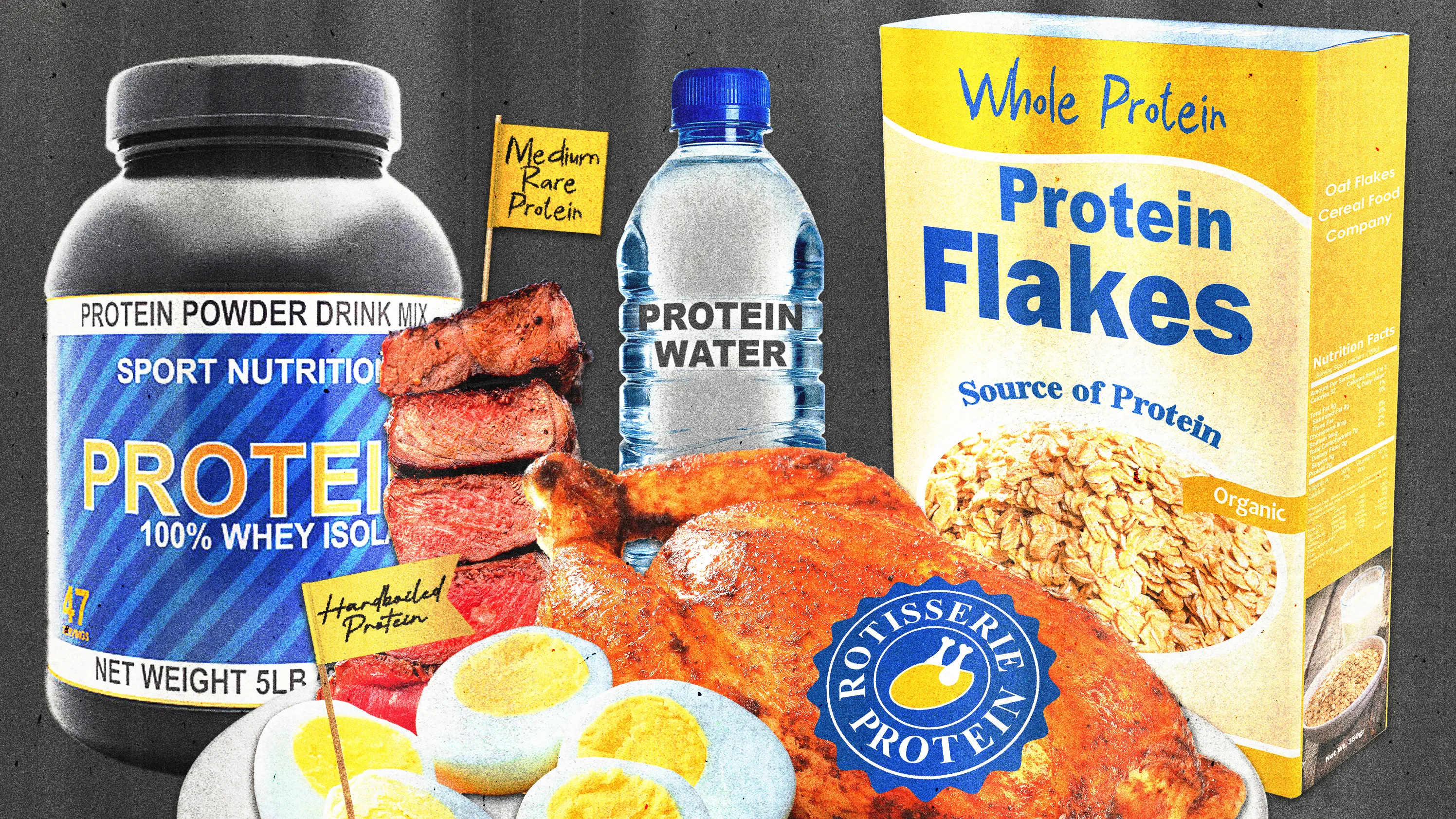Copyright gq

High-protein everything is all the rage right now. From protein-packed cereal and pasta to even protein water, the highly marketable macronutrient is seemingly being added to every food item imaginable. But despite the hype, chances are you’re already getting “enough” protein—the amount of which depends on factors like age, weight, lifestyle, and goals—for general health. According to the 2020–2025 Dietary Guidelines for Americans, most men ages 19 to 59 exceed the recommended dietary allowance (RDA) of 0.8 grams of protein per kilogram of body weight, largely via meat, poultry, and eggs. Sure, when you’re trying to bulk up, maintain muscle, or lean out, it makes sense to increase your intake of the satiating, muscle-preserving macro. But if you’re pounding a handful of eggs for breakfast, a half-pound of chicken breast for lunch, and a huge steak for dinner—alongside a midday protein bar and post-workout protein shake—you might be doing more harm than good. So how much protein is too much, and what actually happens when you overdo it? How Much Protein Do You Need a Day? For healthy adults, regularly exceeding the RDA isn’t necessarily a problem. (For reference, the RDA would be about 67 grams of protein daily for someone who weighs 185 pounds.) “In general, up to 2 grams of protein per kilogram of body weight per day is considered safe,” says Samantha Cassetty, MS, RD, nutrition and wellness expert and coauthor of Sugar Shock. Some research supports more generous thresholds of up to 2.2 grams or 2.5 grams, with tolerable upper limits of 3.5 grams for select individuals like bodybuilders or elite athletes. These figures may sound high, but Cassetty notes the RDA is designed to prevent deficiency, not optimize metabolic health or body composition. Many longstanding fears about high-protein diets—such as kidney damage, calcium depletion, and dehydration—don’t hold up in healthy individuals eating balanced diets, she adds. One 2024 meta-analysis looking at over 148,000 individuals even found that higher total, plant, and animal protein intake were all correlated with decreased incidence of chronic kidney disease. That said, protein enthusiasts shouldn’t assume they get a free pass, especially if they’re managing or at risk for chronic health conditions. What Happens If You Eat Too Much Protein? When evaluating protein intake, the source can be just as crucial as the quantity when weighing risks versus rewards, says Kaustubh Dabhadkar, MD, a cardiologist specializing in preventive cardiology in Charlotte, North Carolina. For example, getting the bulk of your protein from processed meats—like bacon, salami, and hot dogs—or from fatty cuts of red meat significantly increases the risk of heart disease. “They act through multiple pathways, including a rise in inflammatory markers and rise in LDL cholesterol levels,” he explains. Processed meats and protein isolates may also negatively affect gut health, says Divya Mallam, MD, a double-board-certified gastroenterologist at Manhattan Gastroenterology. “They can increase the production of oxidized proteins and advanced glycation end-products, which can negatively impact one's gut microbiome makeup and function,” she explains. Too much protein—especially for those on carnivore or keto diets—can also crowd out important nutrients. “If your plate is all steak and shakes, you might miss out on fiber, antioxidants, and phytochemicals from plants, which can affect gut health, cholesterol levels, and inflammation over time,” Cassetty warns. Some might also rely on highly processed fare—like beef sticks, protein powders, and bars—which bump up protein count but lack the nutritional complexity of whole foods. There's also a physical limit to how much protein your body can process. Most dietary protein is digested and absorbed in the small intestine, says Dr. Mallam, yet an overwhelming amount could lead it to reach the colon. “Once protein reaches the colon, it is fermented by gut bacteria, leading to the production of possibly harmful metabolites such as ammonia, hydrogen sulfide, and amines, which can contribute to increased inflammation in the lining of the intestines.” The potential consequences? Gas, bloating, dysbiosis (i.e., an imbalance between good and bad gut bacteria), intestinal permeability (a.k.a. a “leaky gut”), and even systemic inflammation. In the long run, this environment can increase the risk of inflammatory bowel disease (IBD) as well as colorectal cancer, Dr. Mallam says. Lastly, certain populations need to be extra cautious when it comes to the quantity and quality of protein they’re getting. “Existing health conditions such as obesity, type 2 diabetes, and conditions that affect digestive capacity—such as older age, prior gastrointestinal surgeries, and IBD—can exacerbate risks of excessive dietary protein intake,” says Dr. Mallam. People with reduced kidney function or hypertension should also be careful, especially in terms of consuming animal sources high in saturated fat and sodium. The Right Way to Eat a High-protein Diet In truth, most people don’t need to stress over reducing their protein intake—or, on the flipside, even boosting it by that much. Fit-fluencers and brands in the ever-expanding high-protein sector might lead you to think that the more is always the merrier, but a middle ground is necessary to balance short-term gains with long-term health. According to Cassetty, a modest daily intake of 1.2 to 2 grams of protein per kilogram of body weight should do the trick to build muscle or maintain it while leaning out. “This leaves space for carbs and healthy fats that fuel workouts and support recovery,” she shares. Meanwhile, Dr. Mallam advises consuming no more than 2 to 2.5 grams of protein per kilogram of body weight daily—or ensuring that protein remains within 25 to 35 percent of total caloric intake—to mitigate harmful effects on digestive health and function. It’s also ideal to spread your intake throughout the day to maximize muscle protein synthesis, says Cassetty, which can also minimize digestive distress. It bears repeating that the type and quality of protein you choose also counts. “Lean, minimally processed protein sources like chicken, fish, eggs, Greek yogurt, tofu, beans, and lentils don’t raise the same health concerns as daily servings of processed meats or protein powders with artificial sweeteners and additives,” says Cassetty. Poultry, fish, seafood, and plant-based proteins are also associated with a lower risk of heart disease and stroke. Thus, Dr. Dabhadkar says they’re healthier alternatives to the likes of, say, ribeye or pork belly to mitigate risk of cardiovascular disease: the leading cause of death in men, women, and most racial and ethnic demographics. While Dr. Mallam admits that animal protein is typically easier to digest than plant-based protein, cooking the latter can improve digestibility while promoting gut diversity and the growth of healthy bacteria. The Bottom Line You probably don’t need to worry about eating too much protein—unless you’re eating enough protein to feed a family of four on the regular, or stick to a meat-heavy diet long-term. Pay attention to how you feel and how your body responds beyond changes in body composition. And when in doubt, diversify your plate and eat more plants.



